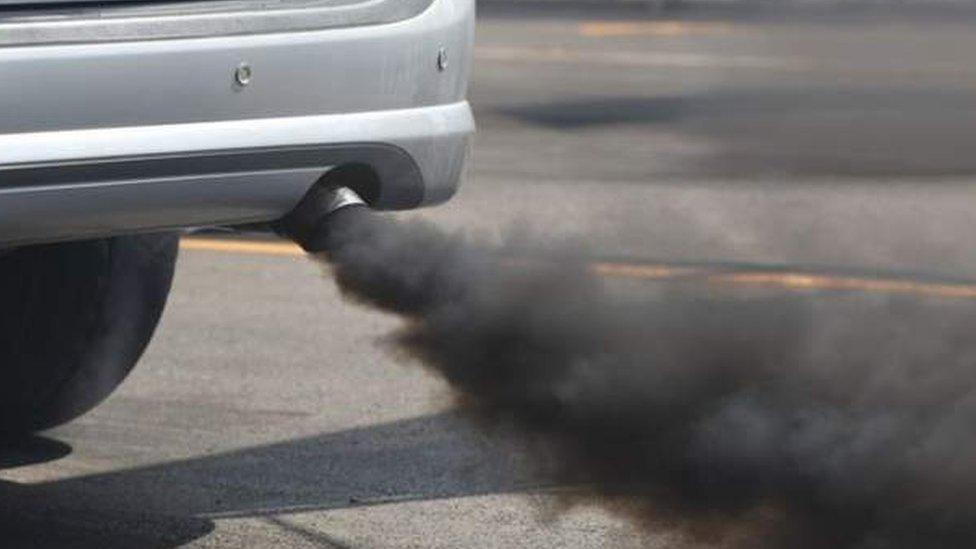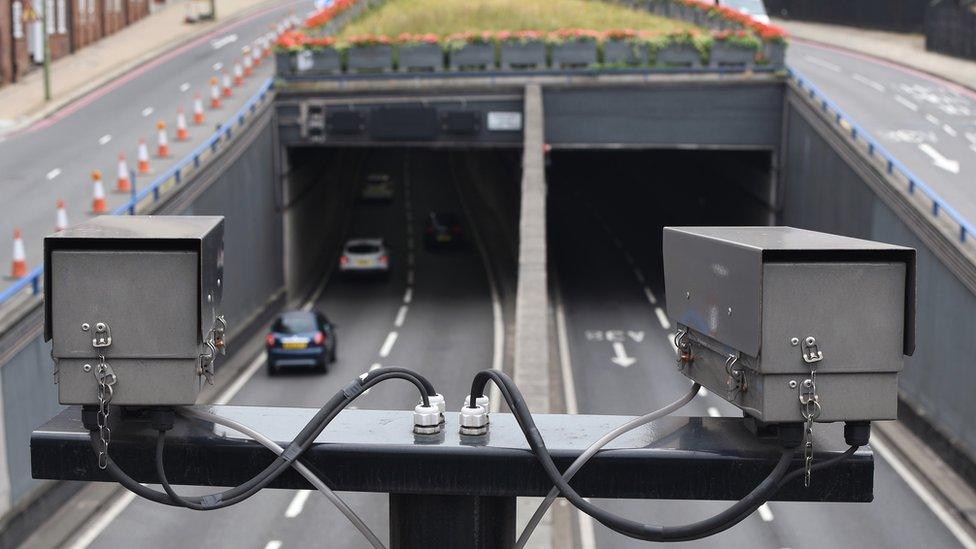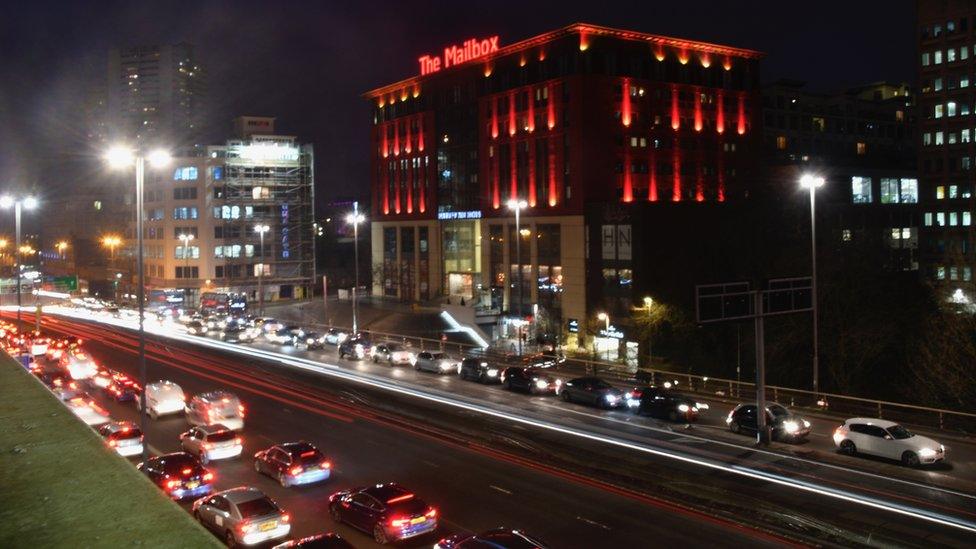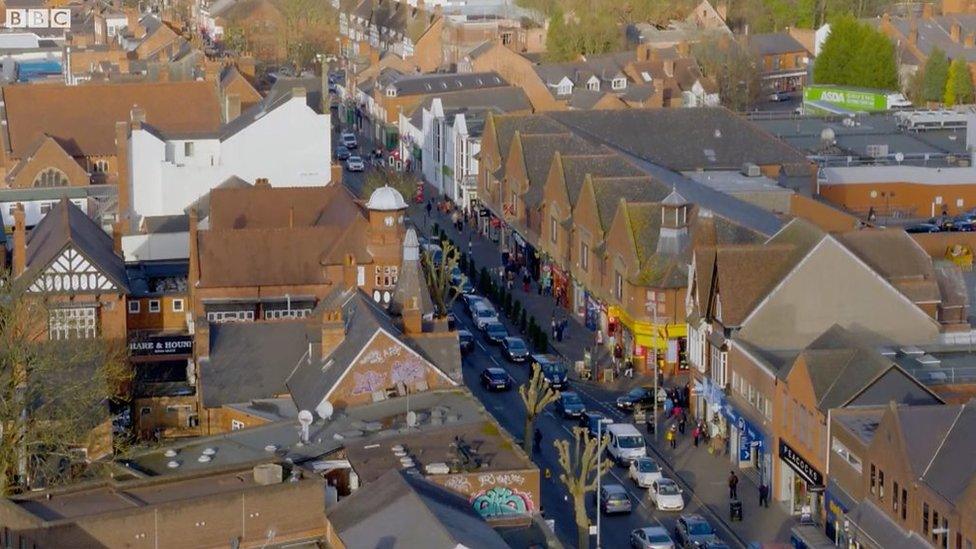Clearing the air in Birmingham - but at what cost?
- Published

2020 vision
It's a lethal cocktail. Nitrogen Oxide (NOx) and PM2.5 particulates in the atmosphere are shortening the lives of an estimated 500 people every year in Birmingham. The British Lung Foundation tell us children and elderly people are most at risk.
Across the West Midlands conurbation, the figure rises to 1,500 premature deaths. And diesel-powered vehicles have been identified as the main culprits.
So you can understand why the Government is pressuring Birmingham's Labour-controlled city council to clean up its act on atmospheric pollution.
On Tuesday, the council's cabinet will consider a report prepared by their senior officials proposing a Clean Air Zone (or CAZ), backed up with a tough charging system which could be in place as early as 2020.
If the report's recommendations are approved, a six-week consultation period would be triggered immediately.
This, broadly, is what we know so far:
Every day they enter the city centre Clean Air Zone, private diesel cars which do not comply with Euro 6 emissions standards and private petrol cars which do not meet Euro 4 would be charged between £6 and £10. Some lorries could be charged up to £100 per day.

Charges would apply throughout the area bounded by the inner ring road, including the A38
This means most diesel cars produced before 2015 and petrol ones made before 2005 would be liable to the charges. They would apply throughout the area bounded by the inner ring road, including the A38 trunk road through the heart of the city.
So this would affect not only those motorists who live or work in Birmingham, or both, but also millions of others who drive into the city every year and on whom so much of the city's economic livelihood depends. If you include buses, lorries and vans, just over half of all journeys in and out of the city would be affected.
What exactly the impact might be on a city still largely dependent on diesel delivery vehicles is, at this stage, literally incalculable.
Final warning
The European Commission has repeatedly warned Birmingham City Council that, as one of the most polluted cities in Europe, it must clean up its act on atmospheric pollution by 2020. If it doesn't, the council could be liable to fines running into many tens of millions of pounds. Behind the scenes, the council has been working on its plans for more than two years, with Automatic Number Plate Recognition cameras monitoring vehicles entering and leaving the city centre.
Yet more advanced and costly technology would be needed before the project could be implemented. London's Congestion Charge involves a complex and costly network of monitoring equipment on the ground, backed up with sophisticated online information technology enforcing the charging regime itself.
Only after the consultation period ends in September will the true costs start to emerge. And then comes.....
The politics
Already the battle lines are being drawn.
The leader of the council's Conservative opposition, councillor Robert Alden, tells us there is nothing in the Government's blueprint for cleaner cities requiring private cars to be charged in this way. The city's Labour leaders reply that it's only by charging private motorists that they have any hope of meeting these tougher environmental requirements.
The report itself raises the potential impact on small and medium-sized businesses, especially those whose owners live and work within the central area. Standby for a tug of war between the Council House and Westminster over demands for the Government to cushion the effects on those who are hit hardest by all this.

The council said any surplus money would go back into the transport budget
The Chancellor Philip Hammond this week warned his Cabinet colleagues that "there's no money left". But the Government can still expect a chorus of demands for scrappage payments to help take the most polluting diesel vehicles off the road, especially because the proposals as they stand are socially regressive: hitting hardest people on lower earnings with older cars.
Whatever eventually materialises, the proposals are having an effect even before we know what they are - 65 of the city's black taxis have been converted to liquid petroleum gas fuelled engines.
And as if to pile on even more political pressure, the Conservative Mayor of the West Midlands, Andy Street, has come out in support of the Government's plan to take not just diesel but also petrol vehicles off the road altogether by 2040.
So here we have a Conservative mayor and a Labour council singing from the same environmental song sheet. Birmingham's cabinet member for transport, councillor Waseem Zaffar, acknowledges the proposals need to win "the acceptance of the community".
This is our big talking point in this weekend's Sunday Politics Midlands, when I'll be joined in the studio by Eddie Hughes, Conservative MP for Walsall North and Ruth Smeeth, Labour MP for Stoke North.
And I hope you will join us too, in our usual 11.00 slot on BBC One Sunday, 24 June 2018, immediately before England's footballers take on Panama in the World Cup.
- Published18 June 2018

- Published11 January 2018
